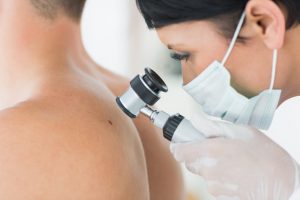4 Tips to Prevent Skin Cancer
As temperatures warm up this spring and we spend more time outdoors, simple daily habits can help protect your skin from cancer.
Decisions on whether you wear a hat, sunglasses and sunscreen or choose to sit in the shade all make a difference in how much you expose your skin to ultraviolet light – a risk factor for skin cancer.
It doesn’t matter what color your skin is or whether you never get a sunburn. Skin cancer can affect anyone. It’s the most common type of cancer nationwide. One in five Americans will develop skin cancer at some point in their lifetime. More than 9,000 people are expected to die this year from melanoma – the deadliest form of skin cancer.
Despite widespread media campaigns about skin cancer prevention, many people do not practice daily sun safety precautions. And millions of Americans continue to use indoor tanning, which can increase the risk of melanoma.
The good news is that it’s never too late to start protecting your skin. Once you get into the habit of wearing sunscreen and seeking shade, it becomes second nature. Parents can help protect their children from developing skin cancer by encouraging healthy habits early on.
Follow these four tips from federal health authorities to lower your risk for skin cancer:
Wear sunscreen, even when it’s cloudy outside.
Choosing the right sunscreen can help you lower your risk of skin cancer. Make sure your sunscreen offers broad-spectrum protection against UVA and UVB rays. Select a water-resistant sunscreen that has a sun protection factor of 15 or higher. Apply sunscreen 30 minutes before you go outdoors.
While creams work well for your arms, legs and face, you may find it easier to use a sunscreen stick around your eyes. Don’t forget to wear lip balm with an SPF of at least 15 and to apply sunscreen on the tops of your feet, your ears and the back of your neck.
You should reapply sunscreen about every two hours or sooner if you go swimming or are sweating. Remember, a higher SPF does not mean it provides longer protection.
If you use a sunscreen spray, make sure you don’t breathe it in. Never spray sunscreen directly on your face. Sunscreen sprays should not be used if the person is going to be near an open flame or another source that may give off sparks, according to the Food and Drug Administration. This includes people lighting cigarettes, grilling and burning candles. In the past, people wearing sunscreen sprays who got close to sources of flame suffered significant burns.
Avoid indoor tanning.
Embrace your skin’s natural color. Don’t use tanning beds because they increase your risk for skin cancer. Using an indoor tanning bed before age 35 can increase your risk for melanoma by 59 percent, according to the American Academy of Dermatology. It doesn’t matter if you don’t get sunburns either. Indoor tanning will still raise your risk of melanoma, research shows. Women younger than 30 are six times more likely to develop melanoma if they tan indoors.
Cover up, seek shade.
If it seems like you always get sunburned in the late spring or early summer, it’s because UV rays from sunlight are the greatest during this time. As a general rule, the hours between 10 a.m. and 4 p.m. are the most hazardous for UV exposure outdoors in the United States, according to the federal Centers for Disease Control and Prevention.
One of the easiest ways to protect your skin is to wear a wide-brimmed hat, sunglasses, long sleeves and pants and seek the shade. Wear sunglasses that wrap around and block both UVA and UVB rays. You can also wear sun-protective clothing that’s lightweight and breathable.
Talk to your health provider about your skin cancer risk.
Some people have a greater risk for skin cancer. Getting sunburned as a kid and having blond or red hair, blue or green eyes, a history of indoor tanning or a personal or family history of skin cancer are considered risk factors for skin cancer.
If you’re worried about a new mole or changes in your skin, see your health provider. Melanomas can grow for a long time under the top layer of skin, which allows them to be detected early, according to the National Cancer Institute. It’s easier for doctors to treat melanoma if it’s found before it spreads.
Easily schedule an appointment online with healthcare provider near you by going to BonSecours.com/Schedule on your phone, tablet, or computer.
Source: https://bonsecours.com/hampton-roads/about-us/blog/4-tips-to-prevent-skin-cancer

Comments are closed